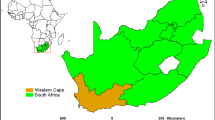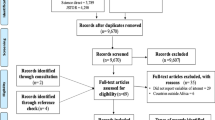Abstract
Cities—especially those with substantial poor populations—will face increasingly severe challenges in tackling the impacts of global environmental change (GEC). As economic dynamos and increasingly important population concentrations, cities both contribute substantially, and often are very vulnerable, to the impacts of GEC. This applies strongly in Africa, one of the world’s poorest regions. The inability of even a relatively wealthy and well-protected city such as New Orleans in the USA to withstand Hurricane Katrina has helped focus attention on the vulnerability of cities that are less protected. Coastal cities and towns from Dakar (which is used as a case study) via Lagos, Cape Town, Maputo and Mombasa to Djibouti contain many low-lying areas, often accommodating concentrations of poor residents, strategic infrastructure and economic production. However, different combinations of challenges will affect many inland urban centres. Tackling GEC successfully will require more than enhanced disaster preparedness. Action to address unsustainable aspects of everyday life and current corporate and institutional activity will be necessary. There can be no simple or universal strategy to reduce urban footprints. Local conditions (biophysical, structural, socio-economic and cultural) produce specific constraints and opportunities in each context.


Similar content being viewed by others
Notes
Commonwealth Foundation Briefing Meeting on Cities and Climate Change, London, 23 April 2008
See also http://www.iclei.org/index.php?id=629.
President Mugabe withdrew Zimbabwe from the Commonwealth in 2003, but the new government is likely to seek readmission soon.
References
Adger, W. N., Huq, S., Brown, K., Conway, D., & Hulme, M. (2003). Adaptation to climate change in the developing world. Progress in Development Studies, 3(3), 179–195.
Awuor, C. B., Orindi, V. A., & Adwera, A. O. (2008). Climate change and coastal cities: The case of Mombasa, Kenya. Environment and Urbanization, 20(1), 231–242.
Betsill, M., & Bulkeley, H. (2004). Transnational networks and global environmental governance: The Cities for Climate Protection Program. International Studies Quarterly, 48, 471–493.
Bulkeley, H., & Betsill, H. (2003). Cities and climate change. London: Routledge.
Business Report (2007). Bulawayo runs dry. Business Report, 1 August. http://www.busrep.co.za/index.php?fArticleId=5019055. Accessed 8 June 2008.
CCGHS (Commonwealth Consultative Group on Human Settlements). (1999). Focus on the habitat agenda: Commonwealth development framework for human settlements. London: DPU for CCGHS and CHEF. http://www.ucl.ac.uk/dpu-projects/drivers_urb_change/official_docs/Focus_on_the_Habitat_Agenda.pdf. Accessed 8 June 2008.
Commission for Africa. (2005). Our common interest: An argument. London: Penguin.
DFID (Department for International Development, United Kingdom). (2006). Reducing the risk of disasters—Helping to achieve sustainable poverty reduction in a vulnerable world: A DFID policy paper. London: Department For International Development.
Dossou, K., & Glenhouenou-Dossou, B. (2007). The vulnerability to climate change of Cotonou (Benin): The rise in sea level. Environment and Urbanization, 19(1), 65–79.
Douglas, I., Alam, K., Maghenda, M., Mcdonnell, Y., Mclean, L., & Campbell, J. (2008). Unjust waters: climate change, flooding and the urban poor in Africa. Environment and Urbanization, 20(1), 187–205.
Grimmond, S. (2007). Urbanization and global environmental change: local effects of urban warming. Geographical Journal, 173(1), 83–88.
Guèye, C., Fall, A. S., & Tall, S. A. (2007). Climate perturbation and urbanization in Senegal. Geographical Journal, 173(1), 88–92.
Gwebu, T. D. (2002). Urban water scarcity management: Civic vs. state response. Habitat International, 26(3), 417–431.
Intergovernmental Panel on Climate Change. (2007). Climate change 2007: The physical science basis. Cambridge: Cambridge University Press. http://www.ipcc.ch/ipccreports/ar4-wg1.htm. Accessed 9 June 2008.
Intergovernmental Panel on Climate Change. (2008a). Climate change 2007: Mitigation of climate change. Cambridge: Cambridge University Press. http://www.ipcc.ch/ipccreports/ar4-wg3.htm. Accessed 9 June 2008.
Intergovernmental Panel on Climate Change. (2008b). Climate change 2007: Impacts, adaptation, vulnerability. Cambridge: Cambridge University Press. http://www.ipcc.ch/ipccreports/ar4-wg2.htm. Accessed 9 June 2008.
Leichenko, R. M., & Solecki, W. D. (2006). Global cities and local vulnerabilities. IHDP Update 2.2006. www.ihdp.org. Accessed 1 March 2007.
McDonald, D. (Ed.). (2002). Environmental justice in South Africa. Cape Town: University of Cape Town Press.
Musemwa, M. (2006). Disciplining a ‘dissident’ city: Hydropolitics in the city of Bulawayo, Matabeleland, Zimbabwe, 1980–1994. Journal of Southern African Studies, 32(2), 239–254.
Parker, D., & Mitchell, J. (1995). Disaster vulnerability of megacities: An expanding problem that requires rethinking and innovative responses. GeoJournal, 37(3), 295–301.
Parnell, S., Simon, D., & Vogel, C. (2007). Global environmental change: Conceptualising the growing challenge for cities in poor countries. Area, 39(3), 357–369.
Pelling, M. (2003). The vulnerability of cities: Social resilience and natural disaster. London: Earthscan.
République du Senegal, ONU-HABITAT & Cities Alliance. (2007). Diagnostic territorial de l’agglomération dakaroise (Résumè executif). Dakar: Projet Strategie de Developpement Urbain du Grand Dakar. Juin.
Sachs, J. (2005). The end of poverty: How we can make it happen in our lifetime. London: Penguin.
Sánchez-Rodríguez, R., Seto, K., Simon, D., Solecki, W., Kraas, F., & Laumann, G. (2005). Science plan: Urbanization and global environmental change. IHDP Report 15, International Human Dimensions Programme on Global Environmental Change, Bonn. www.ugec.org. Accessed 6 June 2008.
Simon, D. (2007). Global change and urban risk: The challenge for African cities. The Constitution, 7(1), 3–22.
South African Cities Network. (2006). State of the cities report. Johannesburg: South African Cities Network. http://www.sacities.net/2006/pdfs/cities_2006.pdf. Accessed 6 June 2008.
Stern, N. (2006). The economics of climate change: The stern review. Cambridge: Cambridge University Press.
UGEC (2008) Short workshop report: Climate change resilience in an urbanizing West Africa. Ile de Gorée, Dakar, 22 February. http://www.ugec.org/docs/WorkshopReport_Short_English_CCResilienceUrbWestAfrica_v3.pdf. Accessed 6 June 2008.
UNCHS (United Nations Centre for Human Settlements). (2001). The state of the world’s cities report 2001. Nairobi: United Nations Centre for Human Settlements. www.unchs.org/istanbul+5/statereport.htm. Accessed 6 June 2008.
UN-HABITAT. (2006). State of the world’s cities 2006/7. London: Earthscan.
UN-HABITAT. (2008). State of the world’s cities 2008/9. London: Earthscan.
UN-HABITAT. (2009). Cities and climate change initiative: Launch and conference report, Oslo, 17 March. Nairobi: UN-HABITAT.
Wilson, E. (2006). Adapting to climate change at the local level: The spatial planning response. Local Environment, 11(6), 609–625.
Acknowledgements
Thanks to UN-WIDER for sponsorship of the workshop, and to the organisers/editors for the invitation to participate. Jenny Kynaston prepared the figures.
Author information
Authors and Affiliations
Corresponding author
Rights and permissions
About this article
Cite this article
Simon, D. The Challenges of Global Environmental Change for Urban Africa. Urban Forum 21, 235–248 (2010). https://doi.org/10.1007/s12132-010-9093-6
Published:
Issue Date:
DOI: https://doi.org/10.1007/s12132-010-9093-6




